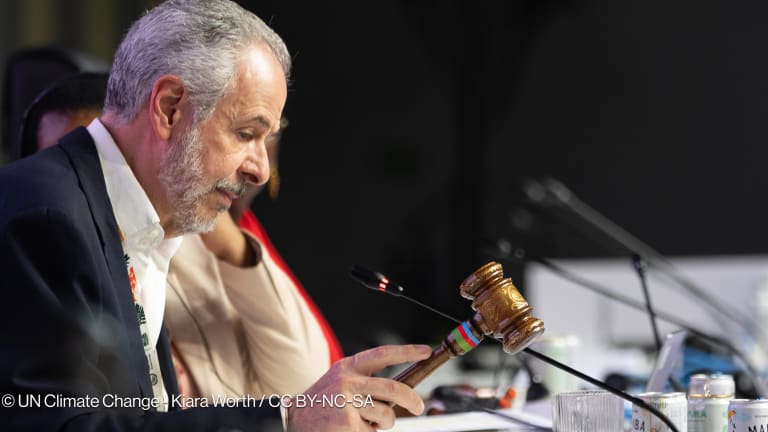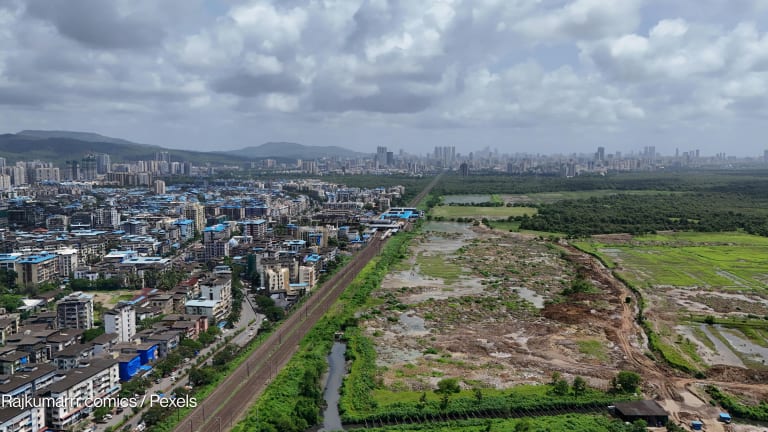Why climate finance is at heart of key UN conference this week
How much money, from where, and in what form — these are the points of contention between the developed and developing world in the climate negotiations currently taking place in Bonn.
BONN, Germany — Climate finance has emerged as a critical issue at the U.N.’s annual midyear climate talks, with developing nations pushing for more financial support from wealthier countries to address the impacts of climate change. While negotiations at the Bonn Climate Change Conference are ongoing to determine the specifics of a new global climate financial goal, a central point of contention revolves around the responsibility of developed nations to provide resources to their lower-income counterparts. “There will be no climate action without climate finance,” Mohamed Adow, director of Power Shift Africa, said Monday at the beginning of the conference’s second week, stating: “The whole point of these negotiations is finance.” Since June 3, governments have been negotiating the technical details of climate policies that will be decided at the U.N. Climate Change Conference of the Parties, or COP 29, next November in Baku, Azerbaijan. There, one of the main objectives will be to define the new collective quantified goal, or NCQG, from 2025, through which high-income countries mobilize economic resources for lower-income countries to support them in the implementation of their climate policies. Sandra Guzmán, general director of the Grupo de Financiamiento Climático para Latinoamérica y el Caribe, explained its importance: “Beyond any mobilization of finance that could occur, this is the only goal for which we can demand accountability.” At the opening of the Bonn conference, Simon Stiell, executive secretary of the U.N. Framework Convention on Climate Change, urged the parties “to move from zero-draft to real options for a new collective qualified goal on climate finance.” The current 35 pages draft text contains multiple different options that represent the different countries' positions, and that are far from a consensus. The figure: How much money will be mobilized The previous climate finance commitment from high-income countries was $100 billion annually from 2020 to 2025. The NCQG must be set from that floor and must take into account the needs and priorities of developing nations. “We don't have a number to come up with,” said Sofía Gonzales-Zuñiga, senior climate policy analyst at Climate Analytics, when asked what would be the ideal figure. “What we can say is that the $100 billion is not enough and has never reflected the needs of the developing world," she added. The Independent High-Level Expert Group on Climate Finance shows that high-income countries need to invest around $2.4 trillion annually by 2030 in emerging markets and developing countries to address the necessary climate action. The latest draft text in Bonn contains an overall goal “in the range of $1.1-1.3 trillion USD/year” as an option. This represents the proposals made by the Arab group and the African group, respectively. Some observers suggest that the quantified target should not be static but updated periodically based on the increasing needs of lower-income countries. GFLAC’s Guzmán shared with Devex that she does not believe that they will leave Bonn with an agreed figure, but with a text that will be as clean as possible for a robust discussion at the political level at COP 29. The sources: Who will mobilize money The main controversy today lies in the attempt by high-income countries to expand the base of contributors to the goal. That is: not only for them to mobilize money but also for some developing countries to provide economic resources. “This is a position led by the United States and supported by other developed countries because they want China and the Arab oil-producing countries to mobilize money,” Guzmán explained. "They are trying to make developing countries fight among themselves to receive the money.” --— Sandra Guzmán, general director, Grupo de Financiamiento Climático para Latinoamérica y el Caribe Legally, Article 9 of the Paris Agreement specifies that the “developed country Parties shall provide financial resources to assist developing country Parties,” while other countries are encouraged to provide support, but voluntarily. This is why developing countries — and civil society organizations — argue the need for high-income countries to assume their responsibility. The other way in which high-income countries are seeking to broaden the base is by including the private sector as an active source of money in the new goal. High-income countries, however, have taken the position that the money should be public. This was reaffirmed by groups including the Independent Association of Latin America and the Caribbean, the Arab group, Grupo Sur, G77, and Cuba in Monday’s plenary meeting. The form: Where the money comes from and goes to Some developed countries have taken the position that if the contributor base is not expanded, there will not be enough money and they will have to choose where to allocate it, experts have observed with concern. "They are trying to make developing countries fight among themselves to receive the money," Guzmán said. On addressing the shortage of money, a recent ActionAid report shows that increasing tax-to-GDP ratios by four percentage points in developed countries can raise over $2 trillion per year toward the international climate finance goal. Another issue under discussion is the form in which the money will be mobilized. The latest Organisation for Economic Co-operation and Development’s report on the $100 billion commitment shows that in 2022, and following a same trend of previous years, 69% of developed countries’ public climate finance provided took the form of loans. Developing countries and civil society organizations are demanding that the new goal be based on contributions that truly help countries — like grants that don’t require a repayment structure — and not that increase their debts in the name of climate action. “The quality of the finance is as important as the quantity. The money should be mobilized as a way of financing, not as a credit,” Jacobo Ocharan, lead of the Oxfam Global Climate Initiative, stated. Negotiators in Bonn are working to unblock these differences and reach the best text possible by this Thursday in order to achieve an ambitious political result at COP 29. “Why does the global south need financing? Because it is their right. The economies that created this crisis are the ones that must pay,” Mwanahamisi Singano, senior global policy lead at Women’s Environment and Development Organization, stressed at an event on the NCQG. “The question about financing is not a question about charity or creating multilateral trust. It is a question of justice,” she added.
BONN, Germany — Climate finance has emerged as a critical issue at the U.N.’s annual midyear climate talks, with developing nations pushing for more financial support from wealthier countries to address the impacts of climate change.
While negotiations at the Bonn Climate Change Conference are ongoing to determine the specifics of a new global climate financial goal, a central point of contention revolves around the responsibility of developed nations to provide resources to their lower-income counterparts.
“There will be no climate action without climate finance,” Mohamed Adow, director of Power Shift Africa, said Monday at the beginning of the conference’s second week, stating: “The whole point of these negotiations is finance.”
This story is forDevex Promembers
Unlock this story now with a 15-day free trial of Devex Pro.
With a Devex Pro subscription you'll get access to deeper analysis and exclusive insights from our reporters and analysts.
Start my free trialRequest a group subscription Printing articles to share with others is a breach of our terms and conditions and copyright policy. Please use the sharing options on the left side of the article. Devex Pro members may share up to 10 articles per month using the Pro share tool ( ).
Tais Gadea Lara is a climate journalist from Argentina. She has been covering the climate negotiations and international politics since 2014. She is currently a climate explorer at the Constructive Institute. She is the author of the newsletter Planeta and collaborates in different media, such as the National Geographic, Climática La Marea, and Climate Tracker. In 2020, she created the Environmental Journalism Workshop to train more people in the communication of the climate and ecological crisis. For several years, she has been recognized as one of the 100 Latinos most committed to climate action.








